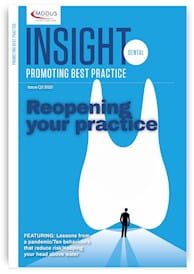These case summaries are based on MDDUS files and are published here to highlight commons pitfalls and encourage proactive risk management. Details have been changed to maintain confidentiality.
BACKGROUND
Mr L attends the dental surgery complaining of pain in LL8. Dr N examines the partially erupted wisdom tooth and makes a diagnosis of pericoronitis. Following discussion of potential risks and complications, Mr L agrees to have the tooth extracted.
LL8 is removed without any problems of note, and post-extraction advice is provided to Mr L, including instructions to contact the dental surgery if experiencing excessive bleeding, undue pain or an increase in facial swelling 48 hours post extraction.
Four days later Mr L attends a hospital emergency department complaining of a large swelling on the left side of his neck. Assessment reveals a parapharyngeal abscess with a displaced uvula. Further observations, including an elevated heart rate and white cell count, lead to a diagnosis of septicaemia.
Mr L is admitted to the surgical ward and given IV antibiotics. The abscess is incised and drained under general anaesthetic but due to post-operative swelling he is kept intubated and transferred to the ICU. Mr L has a protracted recovery in hospital and is discharged eight days later.
A letter of claim is received by Dr N alleging clinical negligence in the treatment of Mr L. It is claimed that the dentist breached his duty of care to the patient by extracting a wisdom tooth which was infected by an abscess. This led to further infection of the neck and life-threatening septicaemia.
ANALYSIS/OUTCOME
MDDUS assesses the case and commissions a report from an expert GDP, who reviews the patient records, radiographs and other relevant documents. The GDP opines that, given a clear diagnosis of an infected wisdom tooth with pericorinitis, extraction is standard treatment. The GDP also notes that there is nothing in the patient records to suggest the extraction procedure was particularly difficult or traumatic, and as such it is reasonable to conclude that the infection was an unfortunate post-operative complication, which is seen with reasonable frequency in such procedures. No evidence supports direct causation by Dr N’s actions of the complications suffered. MDDUS lawyers draft a robust letter of response denying negligence and the case is subsequently dropped.
KEY POINTS
Ensure dental patients are aware of common surgical complications and when to return for further assessment. Record “safety netting” discussions with patients regarding potential complications.
This page was correct at the time of publication. Any guidance is intended as general guidance for members only. If you are a member and need specific advice relating to your own circumstances, please contact one of our advisers.
Read more from this issue of Insight Dental

Save this article
Save this article to a list of favourite articles which members can access in their account.
Save to library